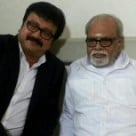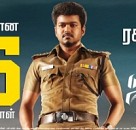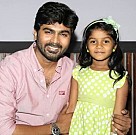"THERE IS SO MUCH SCOPE FOR JOY, CELEBRATION AND MERRIMENT IN THAARAI THAPPATTAI", CINEMATOGRAPHER CHEZHIAN
Interview Team : JyothsnaCinematographer Chezhian brought home many national and international awards for his exemplary work in Bala’s Paradesi. He will once again join Bala’s camp for his next with Sasikumar in Thaarai Thapattai. Chezhian is also an accomplished writer who has brought out books on Cinema and Western Classical music in Tamil. In an exhaustive conversation with Senior Editor Jyothsna Bhavanishankar, Chezhian traces his journey into film industry, his mentor P C Sreeram, his influences, accolades and many more.
PHOTOS & STILLS - GALLERY
Early years
I am from Sivagangai and my parents are teachers- dad is an artist too; he used to draw well and would make toys with clays. Mom was a good story teller and also a singer. It was in an artistic background that I grew up. I took a diploma in civil engineering. I was also interested in photography right from my early days and was into drawing and painting.
I was basically raised in an environment that was replete with books. I viewed cinema as a culmination of creative expression, decided that I have to enter cinema and moved to Chennai. Since some of my friends were pursuing direction, I also wanted to do the same.
Rudhraiya
That was the time I met director Rudhraiya (Aval Appadithan) and showed him my script. He appreciated it but said that I have serious influences of Bharathi Raja and Balachander. As I was interested in literature, he encouraged me to continue reading and also tried for my admission in Film institute in Chennai but in vain. Since cinema is a visual medium, I decided to first learn photography well and got back to my native place.
I have serious influences of Bharathi Raja and Balachander.
Learning photography
I approached Xavier Thavamani who was running a photo studio in Madurai to learn the nuances of black and white photography as it is a very vital component. Although he hesitated initially, he took me in and I started assisting him. Later I started a photo studio called Salanam in my town and kept shooting whoever passed by.
Xavier had taught me that every face has its own character and one side of the face will always be better than the other. I started experimenting with various lighting patterns to enhance the good side of a face. I knew it was just the starting step for something big in my life and practiced enough. After a while I closed down my studio, took all those photographs and came to Chennai.
One side of the face will always be better than the other
Seeman and P C Sreeram
I met Seeman in Chennai and showed my photographs. He asked me to be in his unit and observe things. Meanwhile I met P C Sreeram. He said he cannot take me immediately but asked me to wait which went on for one and a half years.
P C Sreeram’s training
I joined P C sir after a while. P C Sreeram always has the habit of taking his assistants whenever he was meeting a big shot to basically help them shed the fear and inhibitions about established people. He also would advocate to look at the camera as just a tool and not to look at it in awe. The first person I met upon joining PC sir was Kamal Haasan who was shooting for Hey Ram then which was a memorable day for me.
He prepared me to face the life in Chennai and the film world. He used to give DVDs of world movies, script related books to learn about scripting. He will be constantly motivating and also testing to make you learn the art and stand up to any situation. I worked with him in three films and then started independently.
The first person I met upon joining PC sir was Kamal Haasan
Kalloori and Thambi
Kalloori was officially my first film. Actually I was supposed to start with Seeman’s Thambi but since it was a big banner film, they did not choose me. Instead I worked in the capacity of an assistant director and used to teach Madhavan his dialogues. It so happened that the official cameraman who worked in the film, left the shoots after 60 days and hence Seeman asked me to double up as cinematographer.
Madhavan who was used to seeing me as assistant director did not accept this. After much explanation, he reluctantly agreed but upon seeing my footages for the day, he was okay with me. I shot the climax and all the songs and worked for the remaining 30 days. My name had featured as additional cinematographer in Thambi but my full-fledged first film was Kalloori.
Madhavan did not accept me
Paradesi and Bala
I knew Bala from the days of Pithamagan and have met him informally on several occasions. I have sat through a story discussion with him. Once, he gave me the book Eriyum Panikaadu, asked me to read it and sought my take on if it can be made into a film. I was okay with it and that’s how I joined him for Paradesi
Challenges while making Paradesi
First thing that Bala told me after I joined his team was that he was doing that film as an international attempt. He has won many national and state awards and was aiming at a wider reach with Paradesi. I also concurred with his idea and we started.
The foremost challenge was the time period it was set which was 1930s and 40s when there was no electricity in villages. Therefore only natural light had to be used. When we were shooting the village portions, we managed with day light. For the night effects, we used hurricane lights. We had to work with minimal source. As I had worked in still photography and documentaries, it was easy for me to work with available source of light. More than being challenging, the work was interesting to me.
In the tea estate, it was a tough landscape. It was very steep and to climb up, we need to step on to a plant to move ahead. In case it rained, it was tougher. So, to move with the camera and to keep a static frame was quite challenging. This is a practical difficulty.
But the actual challenge rested with narrating a dry and sad story on slaves, amidst picturesque greenery. If you have to depict poverty, you can shoot at roadside or inside a hut. In a way, it was a first of its kind to show sorrow and poverty in a picturesque background which is always associated with romance. It was visually challenging to bring that feel.
More than being challenging, the work in Paradesi was interesting to me
Taking a cue from Robert Bresson
Robert Bresson who is called as the philosopher with the camera always believed in minimalistic frames. According to him- we only want necessary photography, we don’t need beautiful photography. What is needed for the story is what needed from a cinematographer. There is no need to aestheticize the frames.
I took this as my guide for a film like Paradesi. In the life of the slaves, there is no room for beauty but you find it in their hearts and in the truth inside their life and hence there is no need for the outer elements to appear beautiful.
I consider it as a minus for photography when anything else peeps beyond the script and its emotion. Hence, when we saw what we shot, we were struck by the beauty of the frames and the slaves caught our attention only secondarily. I was very keen that emotion should strike first and not the beautiful environs. So we did a lot of test shoots, subdued the colors, worked on them and got a tone that was not like black/white but had its own unique tone. At this juncture, I would like to mention about the freedom that Bala sir gave me. In case he had not agreed with me, things would have been different.
We only want necessary photography, we don’t need beautiful photography
In your book on cinema – Mugangalin Thiraipadam- you have said that Tamil cinema is divided into two types- one coming from Kodambakkam and the other from Alwarpet. Can you elaborate on this?
Fifteen years ago when I came to Chennai, I had stayed with Seeman in whose house, there would always be many people at any given point of time. It was also jocularly said that Seeman has hundred brothers as everybody would be ‘annae’ or ‘thambi’. There used to be a huge vessel in which rice will be cooked and it will be passed on to everyone and you need to manage yourself with the available sambar. There was always a big congregation in his house.
On the other hand at P C Sreeram sir’s place, it was like systematic military school setup from dress code to discipline to punctuality. It was highly organized there. There was an AC office and everything was in English. You can refer to black books (advertising reference) which PC sir used to stack. There was system and that was the style.
Once you cross Kodambakkam bridge, you will hear ‘maaman, machan, pangali…“ and lots of emotion while in Alwarpet, there was no room for emotion; it will be more technical and practical. You can call anyone by name on this part of Chennai.
Kodambakkam cinema is a kind of celebration something like a family and it is personal. In Alwarpet it is like a school where there is no place for emotion and it is professional. It was interesting that I was a part of both the worlds.
At P C Sreeram sir’s place, it was like systematic military school setup from dress code to discipline to punctuality
Learning computers and getting trained under P C Sreeram
It was the time when computers had begun their appearance. Once P C sir asked me if I knew computers and I replied in negative. He gave 24 hours to learn and come back. I somehow learnt from a friend to just start and shut down a PC. Next day I showed my newly acquired skill of switching on and shutting down a computer. I knew that he also knows this much only and I escaped.
When we go to a studio, there will be processing machine. He will make us get the complete details of the machine thereby widening our knowledge. That’s how he will motivate you to learn new things.
Once he called my senior and told him that he is going to test me in a week’s time and that if I don’t clear it, it would be bad. The senior brought in all the books and was teaching me. I had never ever studied like that in my life.
Difference between two schools of learning
P C sir used to address me as ‘muttaal’ and initially I was shocked to be addressed that way as I have always done well in my academics but slowly got used to it. Even now when I commit a mistake, his voice only would sound in my mind.
In Seeman’s area he would always say cinema is easy and one can learn it in 10 days while with PC sir, there is always room for learning and updating.
To put in differently, it was like the approach of a mom and dad. A mom always feels that her child knows everything but for dad his son is an idiot and does not know anything. It was like that of PC sir and Seeman.
P C sir used to address me as ‘muttaal’
Appreciation from P C Sreeram
Although P C Sir had seen my Kalloori and appreciated my work, he had apparently told people not to convey his compliments to me.
I had done a documentary on writer Jayakanthan directed by Ravi Subramanian in which the first shot will be a long drive where a car will be moving on a highway in dark. Jayakanthan’s hair at the ears will just make a fleeting appearance and the car would move off. P C Sir had asked the director if it was his idea or mine. He had appreciated the shot but insisted that it did not reach me. This is what I consider a teacher’s firmness. As my parents are teachers I was able to understand this.
Appreciation is something but the timing is important. When we are appreciated during our growth phase, complacency may set in. But he lauded my work after seeing Paradesi immediately after getting out from the theatre. He called me and said, “I am proud of your work. If you or Bala were to stay near me, I would have hugged you both”. Even in an interview on who is favorite cinematographer, he had mentioned my name. I got the confidence to show my work to him only in Paradesi.
If you or Bala were to stay near me, I would have hugged you both
Learning music
Long back, I read an interview of Ilayaraja where he said, “people come to cinema but nobody seems to know music or wants to learn about it”. Therefore I decided to learn music and was scouting for a suitable master for five years but in vain.
In the interim I came across a harmonium teacher but he insisted that I have the musical instrument to learn. When I expressed my inability to own a harmonium, he asked me not to worry and added that if I were a true learner of music, God will somehow make arrangement to reach the instrument to me. Although I did not believe this, I carried along. Then out of the blue, one day, a friend of mine called me to his house and handed over the harmonium to me. My eyes went moist.
I learnt music for three years with this master and he suggested that I take first grade exams. I somehow felt I can take grade 3 exams but when I was referring the fees structure, 5th grade was just Rs 300 more. Hence I opted for 5th grade and passed with distinction. This was kind of shock to my master but anyways he felt happy.
Writing a book ‘The Music School’ on Western Classical Music in Tamil
I knew I was not going to be a musician but wanted to write a book on Western Classical music based on whatever I have learnt. I showed the first draft to my brother who is musically inclined but he wondered why I had written unnecessary things. He said nothing was comprehendible. When I re-read I understood my mistake and decided to discuss one aspect in one chapter.
I gave this revised version to my wife and she said that although it was good, it was not enough. Then I again worked on it, referred to many books and decided that if someone wants to know basic facts about Western Classical music in Tamil, my book should be their pick.
When I was into it, it kind of went on and on and reached around 3500 pages and ended in 10 volumes each consisting of 350 pages. If somebody wants to learn the basics of western music without master, my book will satisfy.
You are a cinematographer, musician and a writer. Which one appeals to you?
There is a proverb- All roads lead to Rome. Whatever I do, I look at them as a process to understand cinema. When I learn music, it is for me to understand how music is used in cinema. My writing helps me to understand how a scene or an emotion works in cinema.
My thesis for which I was given a Junior Fellowship was about words and at what point a word changes into an image (in our mind). We already have a vision in our mind and when the word strikes it, it changes into a visual medium.
Music is an abstract art, it would convey a few feelings but not some. Words are intellect driven. Drawing and photograph don’t speak as they are visual medium and is equivalent to many words.
I see all these efforts are only to learn cinema by a student.
I look at them as a process to understand cinema
Do you have plans to direct in future?
I came here to direct. When I understood that I need to narrate a story to get the opportunity, I realized it was difficult. I can’t write a story or narrate one for three hours to get a chance. Hence I thought let me at least hide behind a camera to be part of this art.
Although I don’t believe in luck, there is always this factor in my life. My first film Kalloori was produced by Shankar and directed by Balaji Sakthivel; 2nd Rettai Suzhi had K Balachander and Bharathi Raja; I have worked in Alai Payudhe with Mani Ratnam and P C Sreeram and then of course with Bala. Such grandeur associations can happen only if you are a cinematographer.
My sincere devotion and passion towards cinema has got me associated with such masters of Tamil cinema. And so my direction will also happen when situations turn conducive.
Will you score music for your film?
No, I will not do it because music is like a penance. I see cinema as art and music plays an important part in it. I understand the nuances of music and that’s the reason I don’t want to do it. It just does not happen because you have read about it. I am not saying in a negative way but one needs to devote that much of time and attention towards it. It is an art that cannot be done flippantly. My aim is only to understand the various elements of music but not to create it. When you like a subject so dearly, you don’t want to spoil it and let the people who are proficient in it take charge.
Your music school
My wife is the director of the music school and she was the one who converted the contents of my work into a courseware. We have modeled our school on the Jose Antonio Abreu’s El sistema which is run in Venezuela which teaches music to marginalized people. After somebody finishes our course, we give them free classes. You can pay for the exam, take it up. We have people from varied background and age take this up, pass and become hopeful of life. When this develops further, we are planning to have this as free school and also develop as a research center.
Awards
I have got Katha award for short story, Junior fellowship award for literature, Norway film festival award for my short film Kallathoni, six to seven awards for Paradesi and most of them international, the prestigious being the London Film Festival award and also Malaysian film festival award for cinematography for Paradesi.
I did a short film called Pirandha Naal which won the best film award in Kerala which was appreciated by Adoor Gopalakrishnan.
Your next project with Bala
It is going to be on Karagaattam. Whenever Bala starts a subject, he excavates the subject deeply. Karagam is one of the folk arts that has almost become extinct. We have lost all things ethnic like agriculture, culture and our traditional art forms. So this story is about the life of those people who are involved in such art forms and the film would be humorous and also a great populist fare as the premise is such- a happy one that would appeal to many.
In Paradesi, there was much of sorrow but in this film, there is no room for unhappiness. Bala’s touches will be there in the film. Ilayaraja’s music has come out very well. Sasikumar and Varalaxmi are there. There is so much scope for joy, celebration and merriment in Thaarai Thappattai.
There is so much scope for joy, celebration and merriment in Thaarai Thappattai.
















